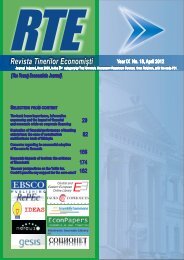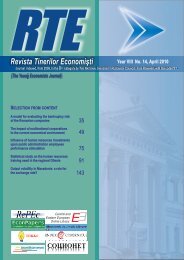Implications of change management in public administration
Implications of change management in public administration
Implications of change management in public administration
You also want an ePaper? Increase the reach of your titles
YUMPU automatically turns print PDFs into web optimized ePapers that Google loves.
Revista T<strong>in</strong>erilor Economişti (The Young Economists Journal)<br />
rates have grown a lot <strong>in</strong> Europe which affected the <strong>in</strong>vestment process and putt<strong>in</strong>g <strong>in</strong>to<br />
practice the regulations <strong>of</strong> the Maastricht Treaty forced the European country to<br />
practice restrictive budgetary policies.<br />
5. a high level <strong>of</strong> the EU unemployment rate is expla<strong>in</strong>ed through the<br />
restrictions imposed by the European economic policies <strong>in</strong> order to fulfill the fixed<br />
criteria through the Treaty regard<strong>in</strong>g the creation <strong>of</strong> the Economic and Monetary<br />
Union.<br />
The European Parliament showed that <strong>in</strong> the current economic conditions<br />
which EU is go<strong>in</strong>g through one should:<br />
Essential objectives <strong>of</strong> the European Union and <strong>of</strong> the member states regard<strong>in</strong>g<br />
the employment policy <strong>of</strong> the workforce should be the follow<strong>in</strong>g: keep<strong>in</strong>g more viable<br />
work<strong>in</strong>g places due to the decrease <strong>of</strong> the short term demand; support<strong>in</strong>g the creation <strong>of</strong><br />
new work<strong>in</strong>g places; susta<strong>in</strong><strong>in</strong>g the purchas<strong>in</strong>g power <strong>of</strong> the unemployed, and their fast<br />
re<strong>in</strong>sertion <strong>of</strong> the labor market.<br />
Coord<strong>in</strong>ated <strong>in</strong>vestments <strong>of</strong> the member states <strong>in</strong> order to carry out the five<br />
essential Lisbon objectives – research, education, active policies on the labor market,<br />
child care and stimulat<strong>in</strong>g private <strong>in</strong>vestments - should represent an essential element<br />
for children and should be considered one <strong>of</strong> the conditions for the improvement <strong>of</strong> the<br />
participations especially <strong>of</strong> the women on the labor market.<br />
One should take <strong>in</strong>to account the requirements regard<strong>in</strong>g the promotion <strong>of</strong> a<br />
high level <strong>of</strong> the labor force, <strong>of</strong>fer<strong>in</strong>g a correspond<strong>in</strong>g social protection, fight<strong>in</strong>g aga<strong>in</strong>st<br />
social exclusion, as well as the requirements regard<strong>in</strong>g a high level <strong>of</strong> education,<br />
pr<strong>of</strong>essional development and human health protection.<br />
Fight<strong>in</strong>g aga<strong>in</strong>st discrim<strong>in</strong>ation on gender, race or ethnicity, religion or faith,<br />
handicap, age or sexual orientation ;<br />
Underl<strong>in</strong>es the importance <strong>of</strong> the actions oriented towards the vulnerable<br />
groups <strong>in</strong> the periods where a high unemployment rate is registered and especially <strong>of</strong><br />
the actions for the unemployed and immigrants;<br />
Considers that the next reform <strong>of</strong> the EU structural funds should be focused on<br />
creat<strong>in</strong>g susta<strong>in</strong>able, high quality jobs;<br />
Underl<strong>in</strong>es moreover the importance <strong>of</strong> the education, not only to <strong>in</strong>crease the<br />
chances <strong>of</strong> the workers to get a job but also their mobility, which is important for the<br />
good function<strong>in</strong>g <strong>of</strong> the <strong>in</strong>ternal market; underl<strong>in</strong>es the importance <strong>of</strong> validat<strong>in</strong>g the<br />
formal and non-formal aptitudes.<br />
The black labor cont<strong>in</strong>ues to be a problem <strong>in</strong> the member states <strong>of</strong> the European<br />
Union. The underground economy underm<strong>in</strong>es the fund<strong>in</strong>g <strong>of</strong> the social security<br />
systems, impedes the development <strong>of</strong> some coherent economic policies and may lead to<br />
social dump<strong>in</strong>g. The black labor is practiced especially by the states from the Eastern<br />
Europe. In EU-27 5% <strong>of</strong> the employees admit they have received ”envelope salaries”<br />
vary<strong>in</strong>g from 3% <strong>in</strong> most <strong>of</strong> the member states up to 10% <strong>in</strong> some <strong>of</strong> the states <strong>in</strong><br />
Central and Eastern Europe. Most <strong>of</strong> these workers are students, unemployed and<br />
authorized natural persons and the fields us<strong>in</strong>g these policies are constructions and<br />
domestic services.<br />
Among the traditional causes <strong>of</strong> the black labor there are high level <strong>of</strong> taxes and<br />
social contributions, as well as the complicated adm<strong>in</strong>istrative procedures which are to<br />
be followed <strong>in</strong> the legal employment. But, newly there is the tendency to subcontract<strong>in</strong>g<br />
and false bus<strong>in</strong>ess. At the same time <strong>in</strong> some member states the transition<br />
regulations for the workers <strong>in</strong> the new EU member states have <strong>in</strong>creas<strong>in</strong>gly used the<br />
124















